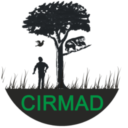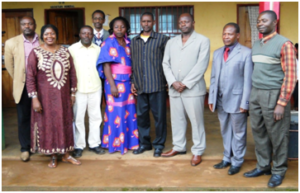In mid 2012 the Centre for Indigenous Resources and Development (CIRMAD) was co-opted as a member organisation of the REDD and Climate Change Regional Coordination for the North West Region of Cameroon. This was in recognition of the involvement of CIRMAD and its members in environmental protection in the North West Region.
Context
The Bali Action Plan of 2007 encouraged Parties to develop pilot projects to assess the feasibility of a potential REDD mechanism. It is based on this that under the auspices of the European Space Agency (ESA) and in the framework of GMES Service Element on Forest Monitoring a pilot project was developed for REDD implementation and testing in Cameroon with user consultation and endorsement in 2007. The initial phase of the project was a user needs and requirements analysis, and forest cover change monitoring. The project later benefited from support KfW and the GTZ for field based assessments of carbon stocks and capacity building training on greenhouse gas accounting, up to 2010.
The general objective of the pilot project consists of establishing a pre-operational system for carbon accounting within the REDD framework and support the REDD readiness process. Specific objectives include:
· creating a platform to strengthen dialogue between key stakeholders;
· identify opportunities for national incentive schemes; detect and assess forest cover and forest cover change;
· develop tools to establish baseline projections of deforestation and forest degradation; strengthen national capacity on carbon stock accounting;
· and foster international exchange.
Cameroon’s National REDD and Climate Change Platform of CSOs
In January 2008, Cameroon’s plans for REDD programmes were approved by the World Bank’s Forest Carbon Partnership Facility (FCPF). (IPS, August 2008). This was following the elaboration and submission of its R-PIN (Readiness Preparation Idea Note).The government of Cameroon through MINEPDED engaged the CSOs and IPs by organizing information and sensitization workshops between January 2010 and June 2011. In July 2011 a 1-day meeting was organized by Cameroon’s Ministry of Environment and Nature Protection and Sustainable Development (MINEPDED) and representatives of 60 CSOs on how best to participate and contribute in all the REDD+ processes in Cameroon. In that meeting the National REDD & Climate Change Platform of CSOs was created and its cardinal role in the REDD+ process outlined.
The Platform succeeded to put in place 30 Regional Coordinators in all the 10 Regions of Cameroon, with technical support from partners. Other information and sensitization workshops on the REDD+ processes were organized between November 2011 and June 2012 for all the ten regions of Cameroon by MINEPDED and its partners. IPs & CSOs are represented in REDD+ National Steering Committee chaired by MINEPDED.
The FCPF granted Cameroon 3.6 million dollars towards implementation of its RPP, which sets out the national strategy. The REDD schemes are meant to reward preservation of forests with carbon credits, which can be sold to polluting companies in the North wishing to offset their harmful emissions. REDD+ extends the concept of rewarding carbon storage beyond forests and plantations to include agriculture. The National REDD Coordination inMINEPDED, Cameroon’s REDD+ strategy is based on a national vision of making REDD+ a tool for the socioeconomic development of the nation, and to be used to better the livelihood of communities. (IPS, August 2008). This was based on the premise that REDD would not work in Cameroon without development from below; without accounting for the activities of the local population who practice agriculture, forest exploitation and livestock farming; therefore REDD should improve their activities and living conditions of the local communities to reduce pressure on the forest.
The National Steering Committee – which includes representation of indigenous peoples – brings relevant government ministries together with civil society organizations and NGOs, while the National REDD and Climate Change Platform provides civil society and local communities with an independent coordinating body.
The REDD and Climate Change Regional Coordination for the North West Region was put in place on 31/07/2012. In its first regional meeting, the three elected organizations organized themselves as follows REFACOF (Leader), NESTCAM (Secretariat) and MBOSCUDA (Finance). They also felt the need and co-opted organizations in the NW active in the domain of REDD and Climate Change, to reinforce the three elected organizations for a better and effective REDD and Climate Change results in the region. And so, the following four organizations came on board and all accepted their admission in the regional Coordination: MIFACIG, CIRMAD, FAP AND COMINSUD.
CIRMAD in NW Coordination
Following this co-opting into the regional REDD + Climate Change platform, CIRMAD was part of the planning meeting of 17/04/2013 the organizing of municipal workshops to set up of three REDD+ and Climate Change platforms in three pilot municipal councils: Belo, Nkambe and Wum Council areas of the North West Region, as earlier decided by the national platform. After the pilot phase the project was expected to subsequently cover the rest 31 of the 34 Municipal council areas of the region, with funding from the national REDD + CC platform.
The objectives of the municipal workshops were:
• Put in place Municipal Coordination
• Share information on the REDD+ Process in Cameroon
• Improve the understanding of CSOs (Civil Society Organizations) on their role in the REDD+ Process
• Lay foundation for intensive and extensive participation of civil society in the REDD+ Process in Cameroon.
For the meeting to set up of the REDD+ CC platform in the Belo Council area on 25/04/2013 which brought together 20 community based environmental-oriented groups, CIRMAD worked (on behalf of the platform) in organization and mobilization for the meeting and the CIRMAD CEO made a presentation on the Environmental Stakes of the Belo Council Area.
As assigned, the others of the organizations co-opted into the regional platform were involved in the setting up of the Nkambe and Wum council platforms. We in the regional platform await the go-ahead, with required funding, to continue the work in the rest 31 municipalities of the North West Region.
By Liyong Emmanuel Sama
Coordinator/CEO of CIRMAD


